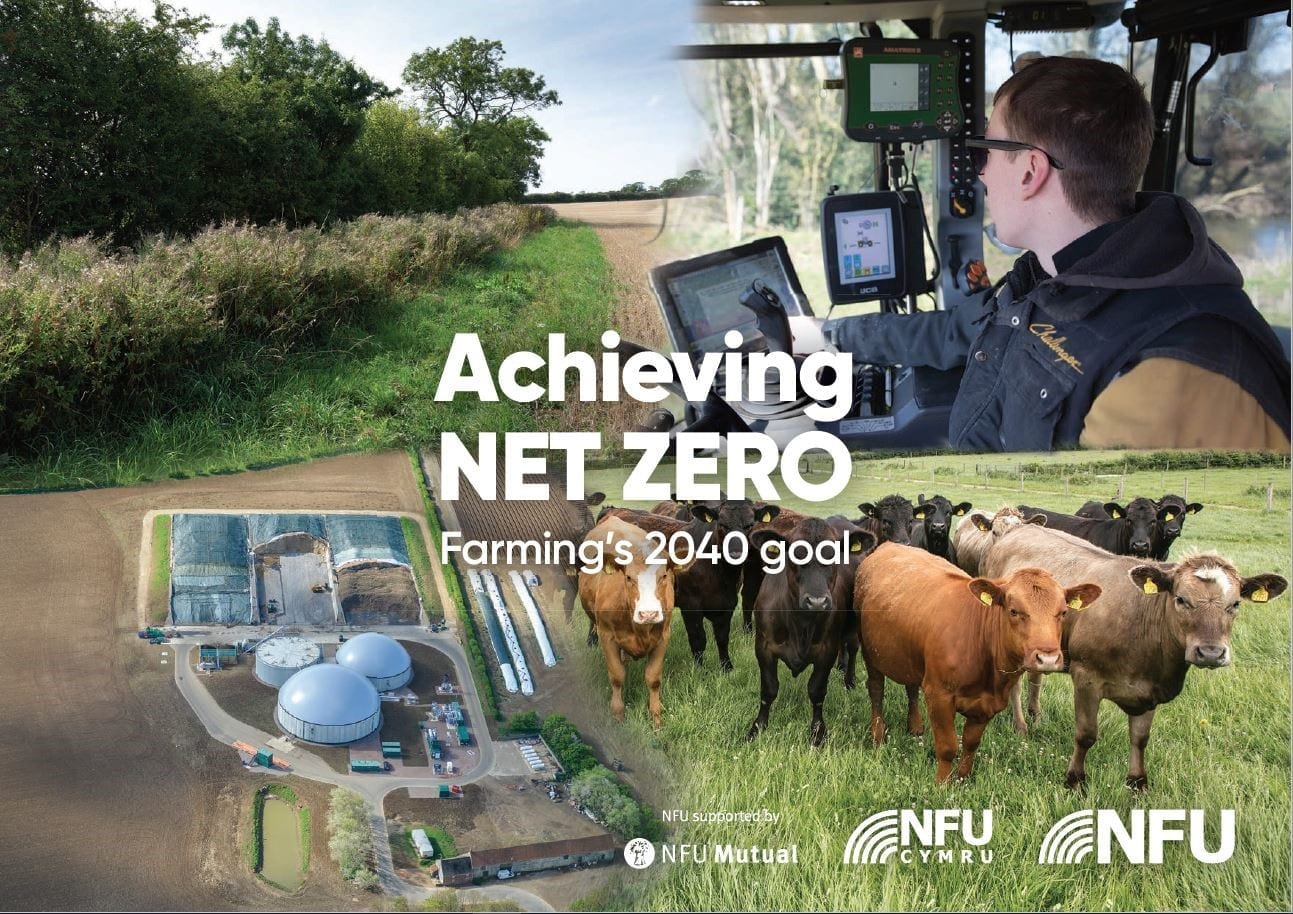In September, the National Farmers’ Union of England and Wales (NFU) unveiled its vision describing how British farming can reach net zero greenhouse gas emissions by 2040.
“Achieving Net Zero: farming’s 2040 goal” sets out three pillars of activity that will contribute to eradicating Britain’s role in global warming by the middle of the century:
- improving farming’s productive efficiency
- changing land use and management to capture more carbon in soils and vegetation
- boosting renewable energy and the wider bio-economy.
The first of these pillars is about reducing emissions, using a wide variety of techniques to enhance productivity and deliver the same output or more from every farm, and working smarter to use fewer inputs.
The second is about increasing farming’s ability to capture more carbon though bigger hedgerows, more trees and woodland, enhancing soil organic matter and conserving existing carbon stores in grassland and pasture.
The third pillar involves displacing greenhouse gas emissions from fossil fuels and removing carbon dioxide from the atmosphere through bioenergy and bio-based materials such as hemp fibre and sheep’s wool.
We aim to build some redundancy into our aspirations, recognising that some measures may not deliver their emissions reductions in full: therefore we believe that a ‘portfolio’ of complementary measures is the best approach.
The NFU believes this is the right time to set challenging goals, consistent with our high standards of British production, welfare and environmental stewardship, as farmers and growers adjust to a new domestic agricultural policy. There are clear environmental and economic imperatives for action.
The pace of decarbonisation of the entire UK economy is going to quicken towards net zero over the next few decades. As an industry, we must respond to growing scientific evidence of the impacts of climate change, and the experience of our farmers and growers weathering extremes of cold, drought and flood in recent years. This year, the Inter-Governmental Panel on Climate Change (IPCC) report on “Climate Change and Land” highlighted that climate change has already affected food security. Agriculture is on the frontline of climate change impacts as well as providing part of the solution. According to one of the IPCC co-chairs, “Balanced diets featuring plant-based foods, such as coarse grains and legumes, fruits and vegetables, and animal-sourced food produced sustainably in low-GHG emissions systems, present major opportunities for adaptation to and limiting climate change.”
Our initial steps are to establish a baseline for UK production of our major food commodities. After that we must have a convincing set of actions for the 2020s, as well as in the longer term, in order to demonstrate that we mean what we say. Achievement of net zero must not be at the expense of agricultural output, food production or our ability to respond to markets.
The agriculture industry will need to work in partnership with Government and other stakeholders to enable UK farming to meet our net zero aspiration. Any ‘Green New Deal’ must incorporate a number of key asks that the NFU has of the policy and politics community:
- Boosting productivity across all farm sectors will require policy measures not just from Defra, but also BEIS, HM Treasury and other government departments;
- Enhancing carbon storage in soils and vegetation requires both the agriculture industry and the environmental NGO community to advocate for carbon pricing to drive multiple agri-environmental benefits, including soil health, biodiversity and resource protection;
- Britain must also develop a strong domestic bio-energy chain in order to have the longer-term potential for future GHG removal, as carbon storage and through a variety of bio-based products.
This is a national aspiration, not an expectation that every farm can reach net zero. Every farmer will start this journey from a different place, taking measures that suit the particular farm business, but no farmer should be left behind.
We believe there is great potential for the crop sector to use technology to fine-tune its inputs, as well as enhancing on-farm carbon storage and displacing fossil fuel usage. Progressive growers who have a good grip on financial cost per tonne of yield will recognise the shift from purely maximising production to optimising productivity. Improving your output/input ratio can drive profitability as well as reducing the carbon footprint of your product. Some growers may find cost and carbon savings in shifting from conventional tillage to min-till or controlled traffic systems, but there is no one-size-fits-all answer.
Under the auspices of the government’s Industrial Strategy, an Agricultural Productivity Working Group has already identified a number of key innovations that should transform food production, such as agri-robotics and electrification of agricultural machinery, and it has called for improved digital and energy infrastructure in rural areas to enable their path to market.
On this final point, the NFU emphasises that support for a productive and profitable climate-friendly agricultural sector has wider public benefits. British farmers and growers are an important part of rural economies, providing jobs and driving growth in diversified businesses. But we will only be able to achieve our carbon neutral goal with concerted support from government, industry and other key stakeholders, acting with us to help us deliver on this ambition.
If you would like to write an opinion piece for the CHAP website, please contact the CHAP team to discuss a specific idea, send us an email at enquiries@chap-solutions.co.uk
Please note, the opinions expressed in this article are the author’s own and do not necessarily reflect the views or opinions of CHAP.













